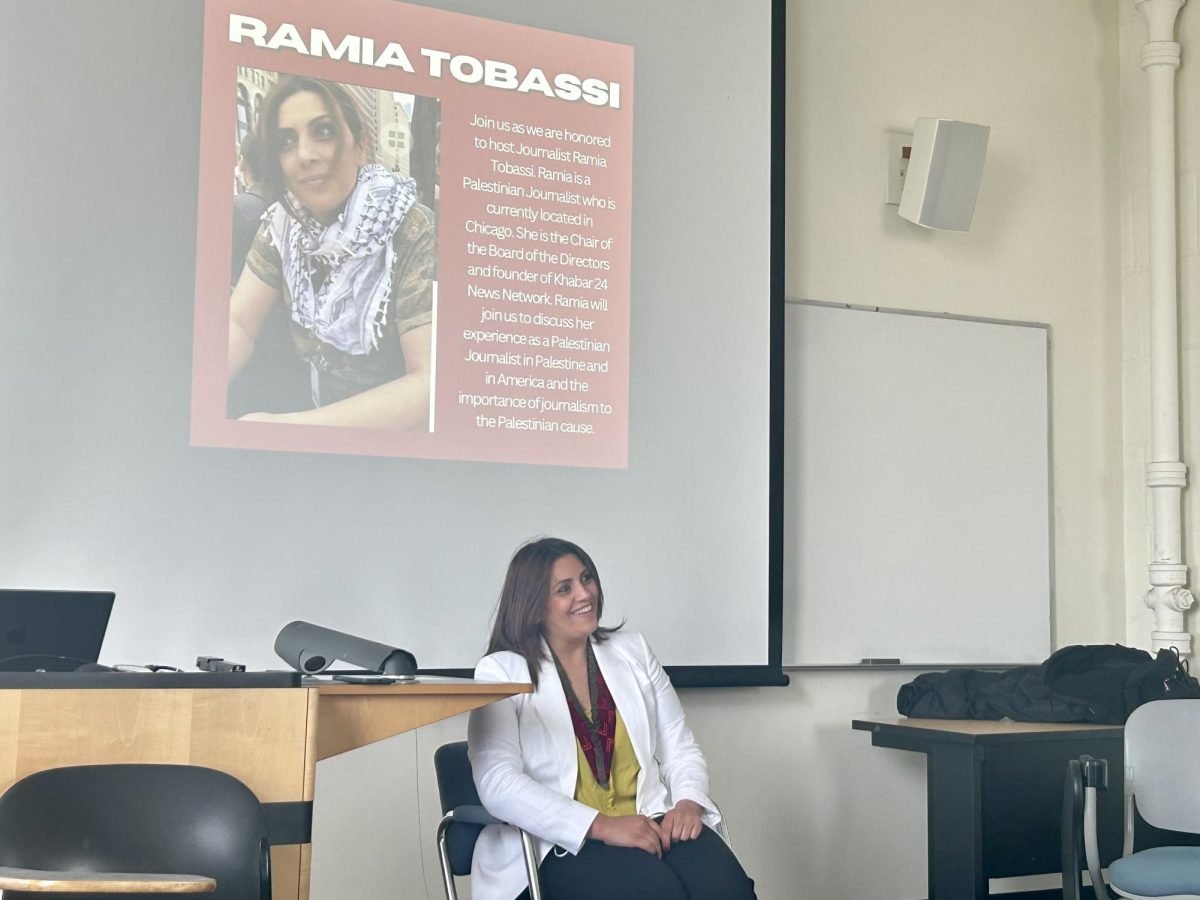Palestinian journalist Ramia Tobassi, founder of the Khabar 24 News Network, shared her experience reporting in Palestine and discussed the importance of journalism at Locy Hall Tuesday.
Northwestern’s Middle Eastern North African Student Association, Educators for Justice in Palestine, Students for Justice in Palestine, Jewish Voice for Peace and Fossil Free NU hosted Tobassi for the fourth day of Palestine Week, an ongoing program centering education about Palestinian history and culture.
Tobassi said she grew up in a family of journalists. She said her father was arrested and tortured by the Israeli government for covering events around him, which she said made the decision to become a journalist difficult.
“That didn’t stop her at all from pursuing journalism,” Tobassi’s translator said. “It gave her power to actually pursue what her dad had been pursuing his whole life.”
Tobassi spoke both Arabic and English during the Q&A, which was facilitated by a student translator.
Tobassi said her journalism experience has been difficult as she was “in the streets” every day due to “clashes in the West Bank,” particularly from 2001 to 2004, a time when she said she was arrested and tortured by Israeli police.
“Journalists in Palestine never get rest,” Tobassi said. “They want to deliver the truth and the truth only, and that’s why it’s very stressful because it puts them in a lot of danger on the daily.”
The event organizer and moderator said she met Tobassi at NU’s now-deescalated pro-Palestine encampment and invited the journalist because she can share a “more genuine connection to what’s happening in Palestine and the people who are currently there.”
According to Khabar 24 News Network’s website, the Chicago-based publication commits to report Palestinian and Arab-centered news and “spread the honest Palestinian narrative.”
“It’s really important to understand the risk and perspective of what it’s like to be a journalist in a different part of the world, especially a part of the world where the everyday average experience of a journalist is so heavily policed,” the organizer said.
Israel continues a ground and air offensive in Gaza following the militant group Hamas’ Oct. 7 attack on Israel, which killed about 1,200 people, according to Israeli authorities. Israel has killed more than 35,000 people in Gaza, according to Palestinian authorities.
Tobassi said 143 journalists have died in Gaza within the past seven months.
She said Palestinians look out for their families, but Palestinian journalists also have to continue reporting current events.
Tobassi shared how she witnessed an Israeli soldier kill a friend and fellow reporter.
“At the same moment you have to finish your work. You have to cover this moment, crying, screaming (and) asking for the ambulance,” Tobassi said. “All of these feelings (come) in the same moment together for the journalist, so it’s not easy to be a journalist.”
Tobassi also highlighted the importance of media literacy in the United States. She said major news outlets use “war” to describe the conflict in Gaza, but she would use the word “aggression” because “what’s going on is that there’s a genocide is being committed.”
She added that Palestinian journalists are targeted because they’re covering “the violence that (Israel) is committing” through the media.
“This is more of a media war than it is a war between the two sides,” Tobassi said.
Despite the language barrier, the organizer said Tobassi successfully delivered her message to the audience.
She added that U.S. readers should seek global news, including Palestinian-based journalism.
“If we want something bad enough, we can find a way to still get access to the thing,” the organizer said. “If the one thing that’s blocking us is a language barrier, then, thankfully, we live in a time with plenty of technology that can help us overcome that.”
Email: [email protected]
X: @kelleylu_
Related Stories:
— Palestine Week opens with art building, keffiyeh history lesson
— Demonstrators stage pro-Palestinian May Day strike following encampment agreement
— Medill Prof. Steven Thrasher speaks at ‘Northwestern Liberation Zone’ on Deering Meadow






